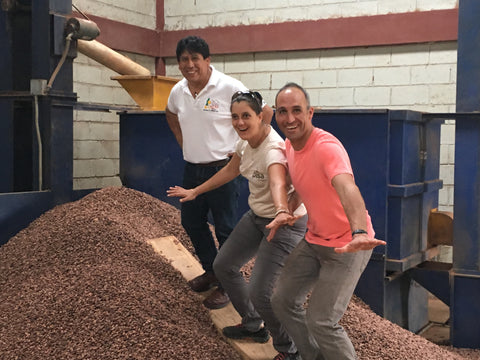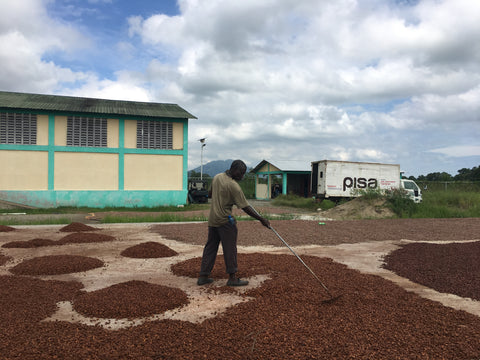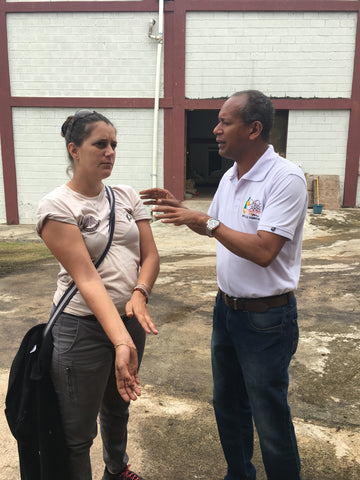By Jesse Last, Taza Cocoa Sourcing Manager
Knowledge exchange between Taza Chocolate's origin partners is not a formal part of our Direct Trade program. Nonetheless, since OKO Caribe's Gualberto Acebey first traveled to Bolivia in 2015 to train our partners at the Alto Beni Cacao Co., a learning community has taken root. Today, whether through emails, Skype calls or in-person visits, our partners exchange ideas ranging from how big to build fermentation boxes to how to improve cacao tree health. As Taza's Cocoa Sourcing Manager, this "Direct Learning" is a dream come true. During my recent travel through Haiti and the Dominican Republic, I got to witness first hand as our partners learned from one another, exchanging tricks of the trade that will make for even better cocoa beans, and in turn, Taza Chocolate!
OKO Caribe's Gualberto Acebey, PISA's Aline Etlicher and Taza Chocolate's Alex Whitmore invent a new sport at OKO's warehouse - cacao bean surfing
Part 1
Samuel Lopez, the quiet and steady farm manager of Finca Elvesia in the Dominican Republic, shakes his head in disbelief. "Muéstrame de nuevo" - show me again, he says. On my phone, I've played a video of our Haitian partner PISA's cacao fermentation and drying facilities. He can hardly believe his eyes. For decades, the Dominican Republic has been the country on the island of Hispaniola with modern processing facilities and high quality cacao exports, while Haiti has sold its cacao into low paying commodity markets. Unable to make a living growing the crop at home, Haitians have crossed the border to earn money harvesting cacao in the Dominican Republic.
And yet, there it is on video - a large and growing processing operation in Haiti's north. Next to me sits Aline Etlicher, PISA's fermentation and drying manager. At first with doubt but soon with interest, Samuel engages with Aline. He swaps stories and asks her questions, gathering lessons from the least likely source he ever imagined - a Haitian exporter of premium quality cacao.
----------
Part 2
A week earlier, I flew into northern Haiti to visit Aline, Max Vieux and Gilbert Gonzales, the leadership behind the pioneering cacao exporter PISA. The operation has grown significantly since Taza Chocolate imported PISA's first container of cacao in 2015. The Haitian company now has clients across the globe, from the US to Europe to Japan and even Australia. Still, PISA's learning continues. This harvest's challenge revolves around how to process ever larger volumes of cacao while maintaining its quality.
To help PISA answer its question, I reached out to Adriano Rodriguez and Gualberto Acebey, co-founders of Taza's largest partner OKO Caribe in the Dominican Republic. Adriano and Gualberto are two of the world's leading experts in cacao fermentation and drying, a process that is closely guarded by most in the industry. Adriano and Gualberto, however, demonstrated their characteristic generosity when they agreed to welcome Aline and Gilbert to their facility and to share best practices.
Before visiting OKO Caribe, I toured PISA's expanding facilities, conducted cacao bean quality checks, and met with farmers. In easily my favorite moment in Haiti’s countryside, one 97-year old producer explains his secret to long life as "eating the healthy food you grow yourself and making sure that God knows you, but the Government does not.” The next day, Aline, Gilbert and I drive across the border into the Dominican Republic to meet Adriano, Gualberto, and Taza's Managing Direct and Co-Founder, Alex Whitmore.
PISA's staff makes sure to rake the cocoa throughout the day to ensure an even, consistent drying of the beans
----------
Part 3
The visit to OKO Caribe is invaluable to Gilbert and Aline and fun for everyone. The weather in the Dominican is appropriately wet - PISA has been struggling with daily rains of their own over the last week. Their cacao will not dry fast enough. Adriano and Gualberto share solutions that range from engineering drying tunnels to maximize airflow to investing in gas-fired driers (basically, massive ovens) that can be used when the climate refuses to cooperate. The experts also share tips around fermentation practices and farmer network logistics - collecting cacao beans from hundreds of small-scale producers is not an easy task. In the afternoon, Adriano and Gualberto's wives join our group for a delicious Dominican meal and an after-meal treat of Taza's newest creation, Dark Bark.
OKO's Adriano explains to PISA's Aline the secret sauce behind a perfect cocoa bean fermentation
Early the next morning when the time comes to depart OKO Caribe for my visit to Finca Elvesia, Aline has an idea. She has learned so much from Adriano and Gualberto, and she wonders if she might join me to see the beautiful Elvesia estate as well. A phone call later, I have a road-trip companion, and a 6-hour drive after that, Aline and I are seated with Samuel, showing him the video of PISA's fermentation and drying plant in Haiti.
----------
Part 4
Later in the afternoon, as we walk through cacao trees on the 100 hectare farm, Aline, Samuel, and Samuel's agronomist Felix exchange expertise. Aline is interested in the health and productivity of the trees - a hectare of Finca Elvesia land produces 3-5x as much cacao as a typical hectare in Haiti, and increasing yields would mean more money for farmers and more cacao for PISA. Samuel, meanwhile, wants to understand how Aline and her team keep temperatures high when fermenting cacao despite regular rains and cold nights; if Finca Elvesia can prevent its cacao from cooling, the quality will improve further.
A beautiful cacao pod growing at the expertly managed Elvesia estate
As for me, I mostly keep quiet. Occasionally I offer a nugget of wisdom picked up from my sourcing travels over the last several years, but these are few and far between. The truth is that I understand how cacao is farmed, fermented and dried, but unlike my companions, it's not my daily work. The greatest contribution I can make here is to bring Taza Chocolate's partners together. The next morning, as we prepare to leave Finca Elvesia, Samuel asks Aline if once the harvest ends, he can visit the PISA facilities in Haiti. "Of course!" she answers. The visit has been a success.





